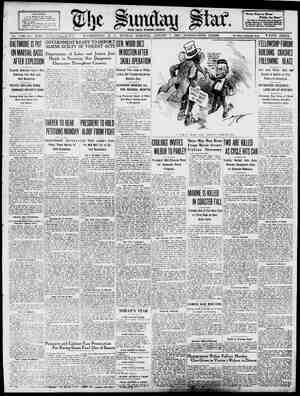Evening Star Newspaper, August 7, 1927, Page 85
You have reached the hourly page view limit. Unlock higher limit to our entire archive!
Subscribers enjoy higher page view limit, downloads, and exclusive features.
THE SUNDAY STAR. WASHINGTON. D. C.—GRAVURE SECTION—AUGUST 7. 1927, S T e~~~y Y R | SN VAVACIAVAVA AN Avava O e~ o — ‘The Sentimental Ones By W. E. Hill. CCopyreht. 1997 by the Chicaco Tribune Syndicate ) O S L oL DL The after-dinner sob speaker get- ting sentimental Telling all the brothers of Ata Eta Ota things about fellowship, friendship through the years and tender memories of Ata Eta Ota days. Going to cry in a T minute and let his voice quiver and Music hath charms, even over the microphone. Look at Gntruna, the lovely waitress, quaver. about to shed a sentimental tear over a Chopin piece via the radio. Gaze also on her dear mistress, Mrs. Floyd Browne-Browne, on the verge of sirupy tears over another radio selection, “Little Annie Roone which Mrs. Browne has mistaken for “Trau- meri”: not forgetting Egbert, Mrs. Browne's son, listening to “Red Lips, Kiss Those (G Blues Away.” and thinking, oh, what tender thoughts about a certain party in town. w wy —r)‘ Mrs. Henry O. Allinall can’t drive through a slum without shedding tears of sentiment over the “kiddies.” Feels awfully sympathetic about poor little tenement children, particularly if viewed through a glass window. T, They call her hard-hearted Hilda around the office, but give her a good sob story and Hilda just oozes sentiment. I was to the pic- tures last night,” Hilda is telling her girl friend, “and they had a perfectly grand filum called *The Seasoned Bride,! with Cleline Clancy. It was about a little shoplifter who got adopted into a wealthy society family, and when she stole from a bakery, just from force of habit, all the society swells snubbed her, and only her poor but honest lover, a railroad brakeman, believed in her and saved her from herself. I cried and cried. it was so sad.” Patriotism. A national hero or heroine of the hour brings out more sentimental emo- tions than you can shake a stick at! Witness, if you please. Mrs. Kate Kube, who has been standing for six hours and 35 minutes outside the hotel where the first woman to crawl on her hands and knees from Troy to Albany is being banqueted. A band is playing and soon the husband and little daughter of the national heroine will bow and throw kisses from an upper window. Hundreds of onlookers will be beside themsclves from pent-up emotion The mother song of the days gone by was very sad and sentimental people paused in their frivolous chatter and let fall a tear when they heard the strains of a gray-haired mother ballad. Here we have a couple on the beach of a Summer afternoon in 1899, “Break the News to Mother” is the tune Arthur is playing on his harmonica. Mamic is trying to sing the words, but something seems to get her in the throat and chokes the very tones of her voice Morton V. Clutch, ‘08, and J. P. D. Grab, ‘03, are hard- Jennie is reading the headlines : “Bond Salesman Mur- boiled boys, except at commencement time, and then ders Sleeping Wife With Ice Pick and Garden Hose. ‘'l = - i p 3 maybe they don't wax sentimental and simply exude songs wanted the insurance for our kiddies so they could have You and Clara don’t appreciate your mother, Harold: you'll be sorrv. when I'm i dcarifling Mater Moyalind e nice clothes, coniesses prisoner, sobbing.” and so on down gone, you didn't heed me.” A few hours spent in gentle retrospection will bring tears the page >oor man,” murmurs Jennie, “1 do hope he of sentiment to a fond mother’s cyes, what with thinking about motherhood and all it gets off with just a reprimand.” doesn't mean to the ungrateful young folks (drat ‘em) nowadays. T 4 P M
